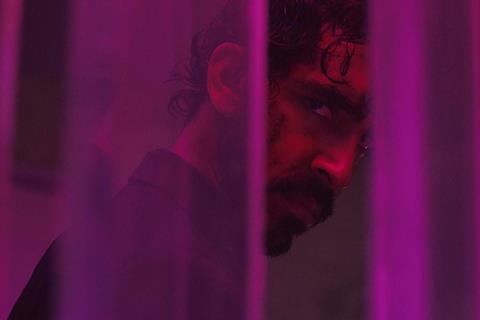Dev Patel’s ferocious directorial debut sees him star as a Mumbai underground boxer seeking revenge

Dir: Dev Patel. US. 2024. 113mins.
Dev Patel makes his directorial debut with Monkey Man, a politically conscious revenge action thriller about an underground boxer in Mumbai who wears a monkey mask and earns money by throwing fights. That bruising gig, however, is only a side hustle to earn enough money to find the man who burned down his peaceful village and murdered his mother (Adithi Kalkunte). As a star, Patel has rarely been better. And as a director, he grants an intoxicatingly gruesome vision of the kind of gritty vehicles he could steer in the future.
The rarely-seen fiery combustion of an actor into an action star.
Monkey Man took a circuitous route to its SXSW world premiere. Patel wrote the script with Paul Angunawela and John Collee, originally producing the film with Netflix partnering for worldwide rights. With shooting completed in 2021, Jordan Peele’s Monkeypaw Productions took over. The resulting picture is a high-octane crowd pleaser taking well-worn influences from action cinema’s greatest hits, with the potential to grasp John Wick-level success when Universal release in multiple territories, including the US and UK, on April 5.
Like many great revenge flicks, Monkey Man thrives on mystery and mythology. Its center derives from the Hindu epic poem Ramayana, where legend of the deity Hanuman — who as an infant mistook the sun for a mango – resides. Similar to many Indian children, Patel’s enigmatic character heard these stories early in life, inspiring him as an adult to adopt a monkey mask in the boxing ring.
While the plotting to move its anti-hero from dive fighter to infiltrating an gangland sex palace is rough, the scripting imbues Patel with a ‘man with no name’ persona. He takes on the moniker of Bobby, becoming a dishwasher in the bowels of the skyscraper, then moves up the ranks to the penthouse where Rana (Sikandar Kher), the man who beat and killed his mother, dwells, and a mysterious sex worker (Sobhita Dhulipala) catches his eye.
As Bobby, Patel swerves away from egotism. He is not a movie star trying to prove his invincibility. In fact, Bobby routinely is thrown about and curb-stomped by superior foes. When he finally gets his chance at revenge, not only does he miss, he is also nearly murdered during the assassination attempt; one of the film’s many intricately staged and bruisingly rendered brawls. Before he can make another bid for retribution, Bobby must be nursed back to health by a tribe of trans women led by the sage Alpha (Vipin Sharma).
Though Patel has clearly designed Monkey Man to achieve bloodlust cheers, it is also a political piece. The corrupt cop Rana and the religious leader (Makarand Deshpande in an underdeveloped role) he serves — a kind of kingmaker using the poor’s suffering for his own capital — are emblematic of the fascist wave presently threatening India. Patel and editors Dávid Jancsó and Tim Murrell hammer out a haze of real, violent news footage featuring images of public descent into violence against minorities. Patel’s general political ethos feels slightly too broad to wholly achieve rebellious sucess, although these components may have more context for, and make more of an impact on, Indian viewers.
Patel’s kinetic verve better suits the film’s many bracing action sequences. This is not a classically-framed picture constructed with clean compositions and by fluid editing. The filmmaking here is ferocious. The ravenous lens snorts, consumes, sweats and seizes to the point of incomprehensibility, dishing out a puzzle of neon-smeared closeups where broken bodies become visual statements in themselves.
The jagged aesthetic mood mirrors the fury Bobby feels about the rampant economic inequality overtaking India, the scenes of abject poverty on the streets of Mumbai, and the death of his mother — which is often referenced through blurred, fractal flashbacks suggesting the incomplete memory of a traumatised child. Woozy POV shots and immersive handhelds, coloured by a generous use of deep reds, allows Patel the range to gleefully make reference to Oldboy, Enter The Dragon, The Wrestler, John Wick and others, remixing their best scenes for potent new spells.
What Monkey Man says about Patel as an actor might be its most fascinating consequence. Ever since he broke out with the one-two punch of Skins and Slumdog Millionaire, he has worked to find his niche in Hollywood. Prototypically, he plays men stranded in arrested development by some tragic event in their childhood. Those origin stories have always served his doe-eyed boy-next-door charm well, yet have limited him from expressing a fuller range of complicated emotions. Monkey Man is working from the same baseline, but with a new rugged twist. His supple frame cuts an imposing silhouette, viscerally punching faces into bloody pulps while consciously provoking sympathy. It’s that jarring physicality that may leave many surprised by the kind of deadly destruction that runs far from the emotion this star usually represents.
As he moves though armies of bodyguards, soundtracked by a thrumming, percussive score, the unbridled savagery on display isn’t merely a performer losing himself in his sadistic choreography. It’s the rarely-seen fiery combustion of an actor into an action star.
Production companies: Universal Pictures, BRON Studios, Creative Wealth Media Finance, Lost Winds Entertainment, Lucky Elephant Media, Minor Realm, Monkeypaw Productions, S’YA Concept, Thunder Road Pictures
Worldwide distribution: Universal Pictures
Producers: Dev Patel, Jomon Thomas, Jordan Peele, Win Rosenfeld, Ian Cooper, Basil Iwanyk, Erica Lee, Christine Haebler, Sam Sahni, Anjay Nagpal
Screenplay: Dev Patel, Paul Angunawela, John Collee
Cinematography: Sharone Meir
Production design: Pawas Sawatchaiyamet
Editing: Dávid Jancsó, Tim Murrell
Music: Jed Kurzel
Main cast: Dev Patel, Sharlto Copley, Pitobash, Vipin Sharma, Sikandar Kher, Sobhita Dhulipala, Ashwini Kalsekar, Adithi Kalkunte, Makarand Deshpande































